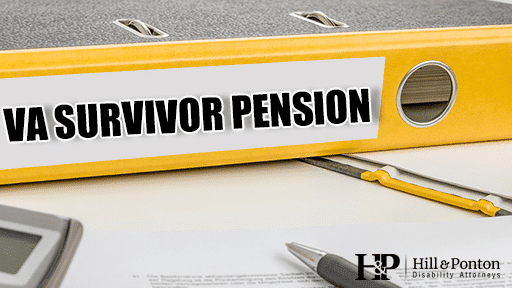The passing of a veteran is often very difficult on the surviving veteran’s family members. It is especially difficult if the former service member left behind young dependents. The U.S. Department of Veterans Affairs provides benefits to qualifying survivors in order to ease the financial burden when the veteran passes. There are three types of survivor benefits available to survivors of veterans:
- Survivors’ Pension (as referred to as “Death Pension”)
- Dependency and Indemnity Compensation (DIC, disability compensation for a veteran’s death as a result of a service-connected disability)
- Accrued Benefits
In this post, we will discuss Survivors’ Pension. Also referred to as Death Pension, this benefit is an income-based monthly payment available to qualifying survivors after a veteran’s death.
Who is considered a qualifying survivor?
In order to be qualified for Survivors’ Pension, the survivor must be:
- No remarriage / single spouse of the deceased veteran
- Dependent child(ren) under 18, under 23 if attending school, or permanently incapable of self-support due to a disability before the age of 18 for the surviving child.
Eligibility for Survivors’ Pension
In order for a surviving spouse and/or dependent to receive survivors’ pension, the deceased Veteran must have met the following service requirements:
- For service on or before September 7, 1980, the Veteran must have served at least 90 days of active military service, with at least one day during a war time period constituting them wartime veterans.
- If he or she entered active duty after September 7, 1980, generally he or she must have served at least 24 months or the full period for which called or ordered to the line of duty with at least one day of wartime service during a war time period.
- Was discharged from service under other than dishonorable conditions.
Note: This particular VA benefit does not require the veteran to be service-connected for disability benefits and disabling conditions in order for survivors to obtain this benefit.
How the VA calculates Death Pension
Survivors Pension is calculated according to the countable family income and the annual pension limit set by Congress.
Countable income includes income from most sources as well as from any eligible dependents, including:
- Earnings
- Disability and retirement payments (including SSI, SSDI, or Social Security retirement)
- Interest and dividend payments from annuities
- Net income from farming or a business
If your total countable income is more than the Maximum Annual Pension Rate (MAPR), then you are not eligible for VA Survivors Pension for that year. You may reapply again at any time your countable income falls below the limit.
For example: The annual income limit for a surviving spouse without a dependent, as set by Congress, is $8,630 (effective December 1, 2014). If your current income is $6,000, your VA Survivors Pension will be $2,630 ($8,630 – $6,000 = $2,630) paid in monthly installments.
Note: For purposes of calculating Survivors’ Pension, the VA also considers any countable income for eligible dependents. If, for example, a surviving spouse has an adult disabled child, who is receiving Social Security Disability Insurance (SSDI), the monthly benefit for that dependent would count towards the family income.
The VA recognizes that unreimbursed medical expenses can take a toll on a family’s income. For this reason, a portion of unreimbursed medical expenses (what was paid out of pocket after medical insurance pays) may reduce countable income, as calculated for pension purposes. In order to be reimbursed, medical expenses would have to exceed 5% of the MAPR for the given year. For 2014, this would equal $431.00 or less.
For example: Linda is a surviving spouse of a deceased veteran. Her out-of-pocket medical expenses for 2014 are $650. Her countable annual income is $7,450. Due to her medical expenses, her annual income is now $ 6,800 ($7,450 – $650 = $6,800). Her annual pension amount is $1,830 ($8,630 – $6,800 = $1,830), or $152.50 per month.


